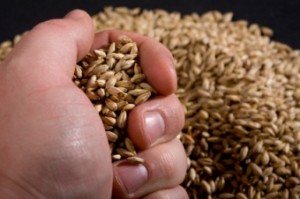 This week I offer a tip for extract brewers about steeping grains and why its important not to steep your grains with too much water. Many extract brewers start by steeping their grains with their entire boil volume, which can lead to excessive tannin extraction.
This week I offer a tip for extract brewers about steeping grains and why its important not to steep your grains with too much water. Many extract brewers start by steeping their grains with their entire boil volume, which can lead to excessive tannin extraction.
Steeping Grains in Extract Brewing and Tannins
Tannins are a form of polyphenol in grains that has a harsh, bitter, “sucking on a tea bag” flavor to it. Tannins naturally occur in grain husks and some are extracted when you either steep or mash grains for brewing beer. Most all grain brewers are aware of the risks of oversparging grains which can lead to too much tannin extraction.
Most brewers are not aware of the fact that you can get excessive tannins by steeping grains in an extract batch of beer as well. Some extract brewers have heard that steeping your grains too hot, for instance, can result in excessive tannins. Recent research indicates that temperature is not a big risk compared to pH.
Tannins tend to leach out of the grains when we raise the the pH level above 6.0, which can happen at the very end of a long sparge for all grain brewers. So you want to avoid raising the pH of your grains/water above 6.0 or you can get harsh tannins in your finished beer.
Managing pH When Steeping Grains
The average brewing water used by home brewers is slightly alkaline which means it has a pH above 7. If you recall from high school chemistry, pure water has a pH of about 7, but drinking water comes from surface or underground sources where it picks up some minerals which raises the pH to roughly 7.5-8.5 for a typical home.
Fortunately grains are slightly acidic, which means they will lower the pH of the water when you steep them in water. However if you use too much water for a small amount of steeped grains, you can end up with a final pH above 6.0 which will put you at risk for excessive tannins. Darker grains are more acidic so they will reduce the pH more.
So the question is – how much steeping water is “too much”? Well I ran a series of pH estimates based on some “worst case” alkaline drinking water and typical steeped grains such as crystal malt. Keep in mind these are numbers estimated using the water to grain ratio in quarts/lb (a liter/kg is roughly twice these values), and your actual numbers may vary depending on your actual water profile and grains used:
- Water/grain of 2:1 qts/lb – gives 5.58 pH
- Water/grain of 4:1 – gives 5.8 pH
- Water/grain of 5:1 – gives 5.89 pH
- Water/grain of 6:1 – gives 6.0 pH
Obviously those numbers are highly dependent on your water and grain bill, but I would probably stay under 4 quarts/lb which is 1 gal/lb (roughly 8 liters/kg) to be safe. So that means if I’m steeping 2.2 lbs of grains (1 kg) I would recommend steeping with no more than 8.8 quarts (2.2 gal or 8 liters) of water to avoid raising the pH too high and extracting tannins.
If we look at an extract recipe with a small amount of grain – say 2lbs (just under 1 kg) of grains steeped in the full boil volume of 3.5 gal (13.25 liters) of grain you can see that the water/grain ratio is 14 qts/2 lb = 7 quarts/lb (14 l/kg) which is too high.
A Good Rule of Thumb
When steeping grains for an extract brew, use no more than 1 gallon of water per pound of grain (8 liters/kg)
Hopefully you enjoyed this week’s tip. Thanks for joining me on the BeerSmith Home Brewing Blog. Be sure to sign up for my newsletter or my podcast (also on itunes…and youtube…and streaming radio station) for more great tips on homebrewing.
If this premise holds, how to explain biab and the decade+ of discussion and empirical evidence around its use of full boil volume during mashing? All this without adverse off-flavours and tannins through the use of, even, rudimentary mash temp control…
BIAB beers are at higher risk for pH issues and you do need to carefully manage the pH when brewing with BIAB: http://beersmith.com/blog/2015/06/05/mash-ph-for-brew-in-a-bag-no-sparge-and-decoction-mashing/
The premise of this argument is incorrect. Most home brewers have an acidic water source, not alkaline. Even if you’re starting with an alkaline source, the filtering/purification process removes natural minerals, reducing the PH. The more extensive the filtering/purification process, the lower the PH. Furthermore, the more densely populated the area (where the majority of people live), the greater the chance the source is not a natural aquifer, and the water is highly processed. Arid areas such as Phoenix and Southern California also have highly treated water. Those who draw their water from a well or live in the country have a higher likelihood of having Alkaline water.
That’s just not true. Most areas will have slightly alkaline water BECAUSE of minerals in the water. SoCal and Arizona have around the same ph, 8.